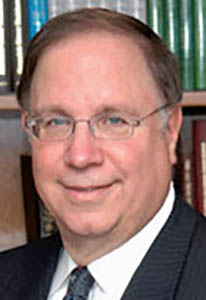
The fear that President Donald Trump might fulfill his campaign promise to relocate the US embassy from Tel Aviv to Jerusalem has caused considerable angst for PA Chairman Mahmoud Abbas and Jordan’s King Abdullah, who met to discuss what steps can be taken to prevent the move. As expected, Abbas claimed this decision “is more than a provocation and will harm the entire peace process.”
The Palestinian Media Watch reported that in a sermon at the Al-Aqsa Mosque, PA Mufti Sheikh Muhammad Hussein said: “The promise of the president-elect [Trump] to transfer the embassy is not only an attack on the Palestinians, but rather on [all of] the Arabs and Muslims. The Muslims and Arabs will not remain silent when they see the aggression realized at the moment of the transfer of the embassy to occupied Jerusalem.’”
The Qatar-based International Union for Muslims warned, “Muslim intellectuals, scholars and leaders will not accept relocating the US embassy to Jerusalem.” Such a move “would fuel the spirit of conflict and sedition, play into the hands of extremists and incite hatred against those assaulting the rights of the Palestinian people.”
For decades, whenever the Palestinian Arabs wanted to thwart anything perceived to be against their best interests, they either threatened violence or precipitated it. The strategy began in the 1920s with such success, they continue to employ this tactic to this day.
Response to Palestinian Arab Violence During The British Mandate: The Beginning of the Policy of Appeasement
On May 21, 1921, an Arab riot against the Jews broke out in Jaffa and spread to other communities, resulting in the death of 47 Jews and more than 146 wounded or injured by May 27. In response, Sir Herbert Samuel, High Commissioner of Palestine, imposed collective punishment and fines on the Arabs and had members of this vicious mob incarcerated.
In keeping with his policy of neutrality, which he expected would persuade the Arabs to accept the right to establish a Jewish national homeland, Samuel sought to placate them by ordering that all future Jewish immigration to Palestine would be restricted by Palestine’s economic absorptive capacity. From this and other experiences with the British, the Arabs quickly learned that violence is a highly effective means of achieving concessions from the British.
After the 1936 Arab revolt began, the British sent the Palestine Royal Peel Commission to Palestine. In July 1937, the Commission issued its report, which recognized: “An irrepressible conflict has arisen between two national communities within the narrow bounds of one small country. There is no common ground between them. Their national aspirations are incompatible. The Arabs desire to revive the traditions of the Arab golden age. The Jews desire to show what they can achieve when restored to the land in which the Jewish nation was born. Neither of the two national ideals permits of combination in the service of a single State.”
In subsequent years, whenever the Arabs wanted to stymie Israeli advancement, they would riot and/or institute a boycott of Jewish businesses. The ensuing conflict would prompt a British, and later an American or EU government, inquiry or fact-finding mission. This would be followed by demands that Israelis make concessions to encourage reciprocal responses from the Arabs that rarely, if ever, actualized.
The failure of the West to hold the Arabs accountable for refusing to accept Israel’s right to exist; their incessant incitement against the Jews in the media, schools and mosques; encouraging and glorifying homicide bombers; and supporting families of those killed or injured in the process of murdering Jews has emboldened the Palestinian Arabs to continue their war against the Jews.
Ending the Charade of Palestinian Arab Innocence
Moving the American embassy can send this crucial message to the Arabs. The days of American appeasement, of viewing them as victims instead of perpetrators of violence, of being held hostage to their duplicity and of their hollow declaration of wanting to live under democratic rule are over.
Jerusalem, with its millennia of Jewish history, is the eternal capital of the Jewish people, not Tel Aviv. The relocation of the embassy does not preclude the establishment of a separate Arab state, because, in fact, that has never been an Arab objective. Every opportunity a two-state solution has been offered, the response has been a violence-accompanied, resounding no.
Why the Refusal to Establish a Palestinian Arab state?
A letter to General Edmund Allenby in April 1920 by Mohammed I. Derweesh, Director of the Arab Club (Moslem and Christian Society), explains clearly how the Arabs truly feel: “We declare that we cannot accept the Jews in our country. Should they be permitted to do what they intend doing, we shall fight against them till death. We have learned from this war to be extremely cruel to those who intend to encroach upon our rights. We declare that we do not accept the Jews neither as guests nor as neighbours in Palestine…”
With the background of Arab violence throughout the Middle East today, let alone continuing Palestinian Arab violence, what in Palestinian Arab behavior or actions suggests that these sentiments do not reflect their views as much or more today as they did in 1920?
By Alex Grobman, PhD
Alex Grobman, a Hebrew University-trained historian, is a consultant to the America-Israel Friendship League, a member of the Council of Scholars for Scholars for Peace in the Middle East (SPME) and a member of the Advisory Board of The Endowment for Middle East Truth (EMET).










